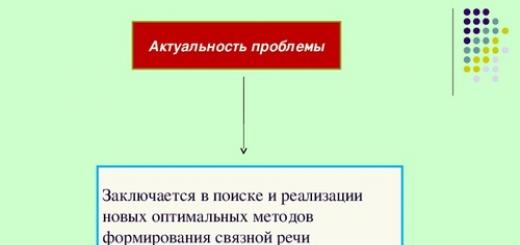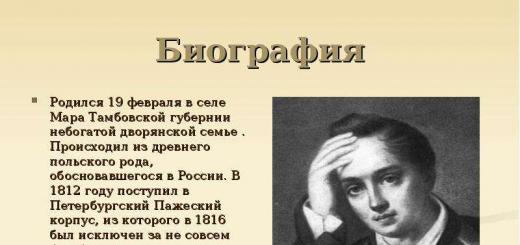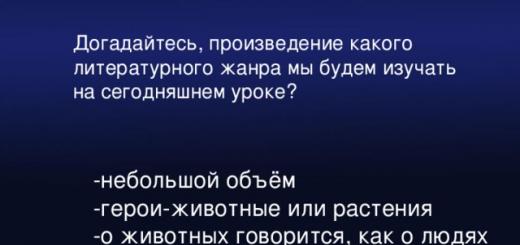Table of personal verb endings
| Number | Face | Endings of the first conjugation | Endings of II conjugation |
|---|---|---|---|
| The only thing | 1st 2nd 3rd | (I) -у(-у)
(You) -eat (-eat) (he she it) -et (-et) | -у(-у)
-hey -it |
| Plural | 1st 2nd 3rd | (We) -eat (-eat)
(You) -et (-et) (They) -ut(s) | -them
-ite -at(-yat) |
Stressed personal endings of verbs
Stressed personal endings of verbs of the present and future simple tense are written in accordance with the pronunciation, for example: you are flying, flying, flying; you scream, they scream(II conjugation); you carry, carry, carry; bring it, bring it, bring it(I conjugation).
After sibilants, the letter is written under stress her) , For example: guard e sew, guard e t, guard e m, guard e those.
Unstressed personal endings of verbs
When writing verbs with unstressed personal endings, you should rely on the indefinite form.
Of the verbs with unstressed personal endings, conjugation II includes:
- verbs with infinitive form -it , For example: ask - ask, ask, ask; buy - buy, buy, buy ( except the verb shave - shave, shave, shave);
- eleven following verbs: look, see, hate, offend, depend, endure, turn; hear, breathe, hold, drive, as well as verbs formed from them with prefixes or suffixes -xia (see, see, look, turn etc.).
In verb lay - lay personal endings are used only depending on the form lay(i.e. I conjugation), for example: steles eat, stele no, stele ut .
Personal plural endings
It is necessary to distinguish between the forms of the 2nd person plural verbs I conjugation indicative And imperative :
- V indicative inclination is written -yeah ;
- V imperative -ite .
For example: What are you writing? yeah? (indicative) - Pish ite a little bit faster(imperative mood); When choose yeah (indicative) the necessary material, you can prepare abstracts. - Choose carefully ite (Imperative mood) examples necessary for illustration.
In verbs of the second conjugation, both in the imperative and indicative moods, it is written -ite , For example: Breathe ite (imperative mood) deeper! - Are you breathing ite (indicative) restless; Turn off ite (imperative mood) gas! — When you turn it off ite (indicative), open the windows.
(50
ratings, average: 5,00
out of 5)
In order to rate a post, you must be a registered user of the site.
Spelling of personal endings of verbs is a rule tested during the state final certification in the ninth and eleventh grades. Despite a large number of hours allocated by the school curriculum to study this topic, many students continue to do annoying mistakes in writing. It is difficult to explain this phenomenon, since the topic can hardly be considered complex.
A little theory about verbs
Words of this part of speech are usually divided into two large groups: conjugated and non-conjugated. The first group consists of verbs that change according to tenses, persons and moods. They have another name - personal. The second group includes the infinitive, participle, gerund, since they do not have grammatical category faces, inclinations.
Personal endings of verbs included in the first group can be unstressed or stressed. The choice of vowels in endings that are under stress does not cause difficulties. The rule says that you should write the letter that you hear. For example, they scream, weave, talk, burn. Unstressed personal endings of verbs should be written based on the infinitive.
In order not to make mistakes in spelling, you need to know what verb conjugation is. The personal endings of verbs depend precisely on this constant morphological feature.
Correct spelling algorithm

To avoid mistakes, you should proceed according to the following plan:
- Put the word in its initial form. It is imperative to ensure that the word and its dictionary form belong to the same type: perfect or imperfect.
- Determine the conjugation at the end of the infinitive.
- Choose the ending depending on the person and number.
Sample reasoning
1. In the sentence “The man is hiding ... behind the curtain at the far window,” a vowel is missing at the end of the predicate. The second syllable -va- is stressed, so the choice of the missing letter must be made based on the conjugation.
2. The person (what is he doing?) is hiding.. This is an imperfective verb, which in an indefinite form will answer the question “what to do?”. The initial form is to hide.
3. The word ends in -ат and is not one of the exceptions, therefore “to hide” is a verb of the first conjugation.
4. Personal endings of verbs of this group are written with a vowel e. In the 3rd person singular form, this word will have the ending -et: A man is hiding behind a curtain at the far window.
Conjugation

There are two conjugations in the Russian language.
The first conjugation includes words ending in -at, -et, -yat, -ot, -ut. For example, drown, bargain, darken, stab, fight, pick, tickle, hang, rush, shoot, weed, blacken.
The second conjugation includes all verbs ending in -it. For example, to stain, demolish, wound, paint, argue, spoil, cut.
However, as is often the case in the Russian language, there are exceptions to the rule. There are thirteen such words, and you need to remember them.
On a note
It is important to remember that words that are formed prefixed way from exceptions, will have the same constant morphological character as their non-prefixed forms. For example, shave, shave, lay, lay will belong to the first conjugation, and endure, consider, hold, drive - to the second.
Very often, students incorrectly determine the conjugation of verbs with the prefix you-, which leads to the wrong spelling of the ending. The reason for this phenomenon may be that the prefix pulls the accent towards itself, which automatically makes the ending unstressed. In order to correctly write the personal endings of verbs, the conjugation must be determined by their prefixless form.
Verbs with the postfix -sya have the same constant morphological feature as their verbs. For example, shave - shave, cut - cut, dig - dig, chase - chase, look - look, throw away - throw away.

Some words can have both conjugations. The word “honor,” for example, has 2 forms in the 3rd person plural: honor and honor.
| face | I | II | ||
| pick | pick out | raise | grow | |
| 1 | picking, picking | I pick it out, I pick it out | growing, growing | I'll grow, I'll grow |
| 2 | you pick, you pick | you pick it out, you pick it out | grow, grow | grow up, grow up |
| 3 | picking, picking | picks out, picks out | raises, raises | will grow, will grow |
Writing vowels
Vowels in the personal endings of verbs that are in an unstressed position depend on the conjugation. Words of the first conjugation end with a vowel e, words of the second conjugation - with a vowel And.
Difficulties can arise with differently conjugated verbs. Unstressed personal endings of verbs of this category can have endings of both conjugations. This group is formed by words want, run, honor. Verbs give, There is and their derivatives do not belong to this group, but also have different endings when changing according to persons and numbers.

Spelling personal endings of verbs does not require students to memorize large amounts of theoretical information. You should place the emphasis correctly, remembering several nuances (conjugation, the phenomenon of heteroconjugation, algorithm for choosing a vowel), and be guided by them when writing.
The verb is one of the most difficult parts of speech in the Russian language to learn and write. The most difficult spelling in this topic is the spelling of verb endings in unstressed position. Their correct writing depends on such a concept as conjugation.
What is conjugation?
Conjugation is linguistic term, denoting a change in person and number of a verb. In other words, this is the set of personal endings that a word acquires when changing person and number. Fortunately for students, there are only two types of conjugation in the Russian language. Whatever verb out of several million existing ones is taken as an example, when changed it will acquire inflections:
- W/Y, EAT, ET in singular and EAT, ETE, UT/YUT in the plural.
- U/YU, ISH, IT, in the singular and IM, IT, AT/YAT in the plural.
Let's conjugate the verb sleep: I sleep, we sleep, you sleep, you sleep, he sleeps, they sleep. Its endings, when changed, show that it belongs to the second conjugation. Another word - live. I live, we live, you live, you live, he lives, they live. Therefore, it is a first conjugation verb.

Prefix you- and verb conjugation
Verbs that have a prefix belong to the same conjugation as the non-prefixed verbs with the same root. This information is very important for words with the prefix You-, which has the property of “pulling off” the emphasis. For example, to determine the conjugation of a word will fly out, you need to remove the prefix, and you get a verb flies with a stressed personal ending, which refers to the second conjugation.
Thus, the endings of verbs in personal forms that are under stress indicate that they belong to one or another conjugation. But what to do if the accent is not the ending, but the stem of the word? Indeed, in this case, the desired letter is not heard clearly, it is in a weak position, and a mistake can be made. A rule comes to the rescue.

How to determine the conjugation if the personal ending is unstressed?
To determine which of the two types of conjugation available in the Russian language a verb belongs to, if the stress falls not on the ending, but on the stem, you need to form the initial form of the word. This form is called an infinitive and you can ask questions to it what to do?(perfect form) and what to do?(imperfect species). Next, you should look at what the resulting word ends with and apply the rule. In other words, unstressed endings of verbs can be written correctly only if their conjugation is determined.
The 2nd conjugation includes verbs that have unstressed personal endings, which in the infinitive form end in -it.
The 1st conjugation includes verbs with personal endings in unstressed position, which in the infinitive end in any letters except -it. These could be combinations -et, -at, -ot, -t, -ch and many others.
For example, the word dreaming. The emphasis falls not on the ending, but on the stem of the word. To determine the conjugation, we put the verb in the infinitive form: what to do? - dream. Ends with - at. This means that this verb belongs to 1 conjugation, and, changing in persons and numbers, it will take the corresponding endings.
You're sawing. Let's form the initial form - to nag. At the end of the word - it, therefore, it is a second conjugation verb, and the set of personal endings will be appropriate.
So, in order to correctly write vowels at the endings of verbs in an unstressed position, you need to put the word in the infinitive form and, depending on what it ends in, determine the conjugation. It seems simple. But if in the Russian language there weren’t a dozen exceptions for every rule, it would not be considered one of the most difficult languages in the world to learn. And in simple rule There are also insidious exception words about conjugation.
Exception verbs
Exceptions are those words that do not follow the general rule. There are 14 exception verbs in the conjugation rule that must be remembered in order to avoid spelling errors.
There are 7 words in -et, which, changing in person and number, take on the endings of verbs of 2 conjugations: these are words offend, depend,endure, hate, watch,twirlsee. For example, the word tolerate accepts the following endings: I tolerate, we tolerate, you tolerate, you tolerate, he tolerates, they tolerate.

4 verbs in - at, which are also not conjugated in accordance with the rule and have personal endings of 2 conjugations: drive, hear, hold, breathe. I hear, we hear, you hear, you hear, he hears, they hear.
And finally, 3 verbs starting with - it - lay,shave And rest on- have personal endings for verbs of 1st conjugation: I am laying, we are laying, you are laying, you are laying, he is laying, they are laying.
The endings of these 14 verbs need to be known by heart, because they do not obey the general rule.
Variably conjugated verbs
It is noteworthy that in the Russian language there are 2 interesting verbs, which are called heteroconjugated, because, when the person and number change, they acquire the endings of the first conjugation in some forms, and the second in others, without obeying any rules. Fortunately, their personal endings are stressed, so there are no errors in their spelling. But they still need to be remembered. These are verbs want And run. When they are conjugated, the following picture is obtained.

Want: I want, we want, you want, you want, he wants, they want(in the singular the verb changes according to type 1 conjugation, in the plural - according to type 2). Run: I'm running, we're running, you're running, you're running, he's running, they're running(in the 3rd person plural form the verb has the ending of the 2nd conjugation, in all other forms - the endings characteristic of the 1st conjugation).
Algorithm for choosing verb endings
So, the spelling of verb endings follows a fairly simple and logical rule; it is important to simply understand it. To correctly write the endings of verbs, you need to be able to determine their conjugation. To do this, you should use a clear algorithm.

1. See where the emphasis falls: on the ending or on the stem of the word (don’t forget about the insidious prefix You: if it exists, it is necessary to determine the conjugation by an unprefixed synonym).
2. If the emphasis falls on the personal ending, then the conjugation is determined from it, in accordance with the rule.
3. If the base is stressed, then it is necessary to put the verb in the infinitive form. The last three letters of the formed form will be important.
- The verb ends in -it (except for three exceptions), which means it is of the second conjugation. Here we also include 7 verbs ending in - there, and 4 verbs -at.
- Verb in initial form ends in any other letters (except for the above 11 verbs), which means it is conjugated according to the type of the first conjugation. Let's add here 3 exception verbs in -it.
4. Verbs want And run- differently conjugated, they cannot be attributed to either the first or the second conjugation, and this feature just needs to be remembered.
Let's sum it up
Spelling verb endings requires knowledge of the rules and the application of a clear algorithm. The main thing is to correctly determine which of the two conjugations the word belongs to, and depending on this write the desired letter in an unstressed personal ending. Verbs are insidious, among them there are many exceptions that do not want to obey general rules, but paying attention to the word and applying a simple rule will help you avoid many mistakes!
What personal ending should be written for this or that part of speech? This question arises quite often among schoolchildren, but only if the last syllable of a word is in an unstressed position. After all, it is in such situations that it is very difficult to hear the letter that should be written at the end. This is especially true for verbs.
General information
This or that personal ending of verbs depends entirely on what conjugation it refers to given word. Knowing how to correctly identify it, you will never ask yourself a similar question again.
Personal standing in shock position
WITH stressed endings(personal) verbs are always clear. After all, a letter standing in this position is heard as clearly as possible and is a test letter. Here are some examples: watch, seethe, create etc. As you can see, all the endings of these words are stressed, that is, they are written exactly the same way as they are heard (pronounced).
Spelling of unstressed personal endings of verbs
If the endings of verbs are in an unstressed position, then determining the correct spelling of a particular letter becomes problematic. That is why it is necessary to refer to the corresponding rule. It says that all verbs in the Russian language belong either to the first conjugation or to the second.
Conjugation first
All verbs in the infinitive form ending in -ot, -at, -et, -yat, -ity and -ut belong to the 1st conjugation: melt, dig, get wet etc. The personal ending of these words in an unstressed position has the letter “e”.
Here's an example: melting, melting, getting wet, getting wet, getting wet, getting wet, melting etc. However, in the 3rd person plural. number verbs of the 1st conjugation have the following endings: -ut or -yut. For example, dig, get wet, melt etc.

Second conjugation
All verbs that are in the infinitive and ending in -it should be classified as the 2nd conjugation: nag, be proud, pray etc. The personal endings of these words in an unstressed position have the letter “and”.
Here's an example: sawing, sawing, sawing, sawing, proud, proud, begging, begging, begging etc. However, in the 3rd person plural. number verbs of the 2nd conjugation have the following endings: -at or -yat. For example: sawing, proud, begging etc.
Exceptions to the rules
Now you know which vowels should be written in the personal endings of verbs if they are in an unstressed position. To do this, you only need to determine the conjugation by putting this part of speech in an indefinite form. However, this rule has its exceptions. Let's look at them in more detail:
- Shave, lay. that these words have -it at the end, they should still be classified as the 1st conjugation, since this is an exception. Accordingly, their personal endings will have the vowel letter “e” (-yut, -ut). Here's an example: spread, spread, spread, spread etc.
- To endure, to offend, to see, to depend, to watch, to turn, to hate, to breathe, to hear, to drive, to hold. Despite the fact that these words have -et and -at at the end, they still belong to the second conjugation, since this is an exception. Accordingly, their personal endings will have the vowel letter “and” (-yat, -at). Here's an example: offend, see, dependent, look, twirl, hate, breathe, drive, hold etc.
Exception words should be memorized and remembered, since many schoolchildren make mistakes in them.

Differently conjugated words
Knowing the spelling of unstressed personal endings of verbs, you can quickly and easily compose a literate text. However, it should be noted that in school curriculum The discipline “Russian Language” pays special attention not only to conjugations and exception words, but also to such lexical units, which are heterogeneously conjugated. These include the following: want, run. Why are they called that? The fact is that in different persons these words can have both the ending of the first conjugation and the second:
- he runs, he wants;
- you run, you want;
- I run, I want;
- they run, they want;
- you run, you want;
- we run, we want.

Let's sum it up
To determine one or another spelling of personal endings of verbs, it is recommended to follow the scheme described below:
- Determine in what position the ending of the verb is (stressed or unstressed). If it is in shock, then it should not be checked. If in unstressed, it is necessary to continue the analysis.
- Put the verb into the infinitive (or the so-called indefinite form), and then check its ending. If the word ends in -it, then it is conjugated. Therefore, it is necessary to write the letter “and” at the end (in the third person plural - -at or -yat). Otherwise, it is necessary to continue the discussion.
- You need to check whether this verb is included in the list of exception words in -аt or -еть. If included, then it also belongs to the second conjugation, that is, the ending should be written “and”. If not included, then the first conjugation. At the end you should write “e” (in the 3rd person plural we write -yut or -ut).
Determining the conjugation of a verb with a stressed ending
Verbs of the present and future tenses are conjugated, i.e. change in persons and numbers, while their personal endings change.
There are types I and II of verb conjugation.
If the ending of a verb is stressed, then the conjugation is determined by its personal ending. Verbs of I conjugation have the endings: -у(-у), -ез(-еь), -ete(-еte), -ем(-ьом), -ут(-ут); II conjugation verbs have endings: -у(-у), -ish, -im, -it, -ite, -at(-yat).
For example:
The personal ending of this verb is -yat, which is stressed.
Therefore, it is a verb of II conjugation.
The personal ending of the verb -yot is under stress.
This means that this is a verb of the I conjugation.
§2. Determining the conjugation of a verb with an unstressed ending
But what if the personal ending of the verb is unstressed?
The conjugation of a verb with an unstressed personal ending can be determined in two ways.
Let's look at the first method.
If the ending of the verb is unstressed, the verb must be put in the indefinite form and the indefinite suffix -т- must be highlighted. Then we highlight the vowel before -т-, which is also a verbal suffix.
For example:
(what to do?) engage (suffixes -a-, -t-);
(what to do?) love (suffixes -i-, -t);
(what to do?) straighten (suffixes -i-, -t-).
If a verb in the indefinite form has the suffix -i- before -t-, then this verb belongs to the II conjugation.
In other cases (when in the indefinite form verbs have the suffixes -а-, -е-, -я-, о-, -у-, -ы-, etc. before -т-) the verbs belong to the I conjugation.
For example: let’s determine the conjugation of the verb “pleases”.
Let's put the emphasis - pleases.
The stress falls on the vowel and at the root of the word.
The ending of the verb is unstressed.
Let’s put the verb “pleases” in an indefinite form: (what to do?) to please.
Let us highlight the suffix of the verb of the indefinite form -т- and the suffix before it -a-.
The suffix -a- indicates that the verb “pleases” belongs to the I conjugation.
There is another way to determine the conjugation of verbs with unstressed personal endings.
To do this, you need to put the verb in the 3-liter form. pl. h.
If a verb in this form has the endings -ut(-yut), therefore, it is a verb of the I conjugation. If the verb is in the 3 l form. plural has the ending -at(-yat) - this is a verb of II conjugation.
For example: let’s determine the conjugation of a verb with an unstressed ending “swimming”.
Let's put the verb into the 3-liter form. plural - they (what are they doing?) swimming. The verb float ends in -yut. Therefore, the verb swim is of the first conjugation. Build the verb in 3 liters. plural will have the ending -yat (what are they doing?) are building. Therefore, the verb build is a verb of II conjugation.
In the Russian language there are a number of verbs whose belonging to one or another conjugation just needs to be remembered. The I conjugation includes the verbs: shave, lay, the II conjugation: drive, breathe, hold, hear, twirl, look, see, hate, depend, offend, endure.
Particular attention should be paid to verbs with the prefix you-: pronounce, run out, cut your hair, etc. This prefix on verbs “pulls” the stress onto itself and the ending becomes unstressed.
To determine the conjugation of such verbs, it is necessary to discard the prefix and consider the verb without it.
For example:
pronounce - speak (verb II conjugation), run out - run (verb I conjugation).
In the Russian language, there are also heteroconjugated verbs: in some forms they have personal endings of verbs of the first conjugation, and in others - of the second conjugation.
For example:
verb “to want” in singular has the endings of verbs of the first conjugation - I want, you want, he wants, in the plural. - we want, you want, they want - has verbs of II conjugation.
CONCLUSION
When the personal ending of a verb is stressed, the conjugation of the verb is determined by its ending.
In the case where the personal ending of the verb is unstressed, the conjugation of the verb is determined by the suffix before -т in the infinitive form of the verb.
For exception verbs, the conjugation is determined immediately.
SOURCES
http://znaika.ru/catalog/4-klass/russian/Kak-opredelit-spryazhenie-glagola,-esli-okonchanie-bezudarnoe










